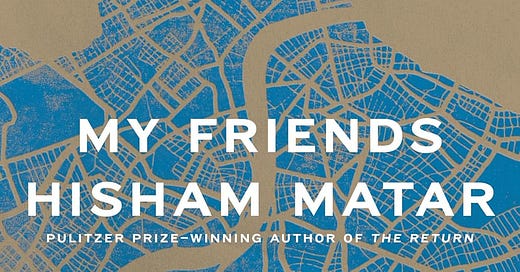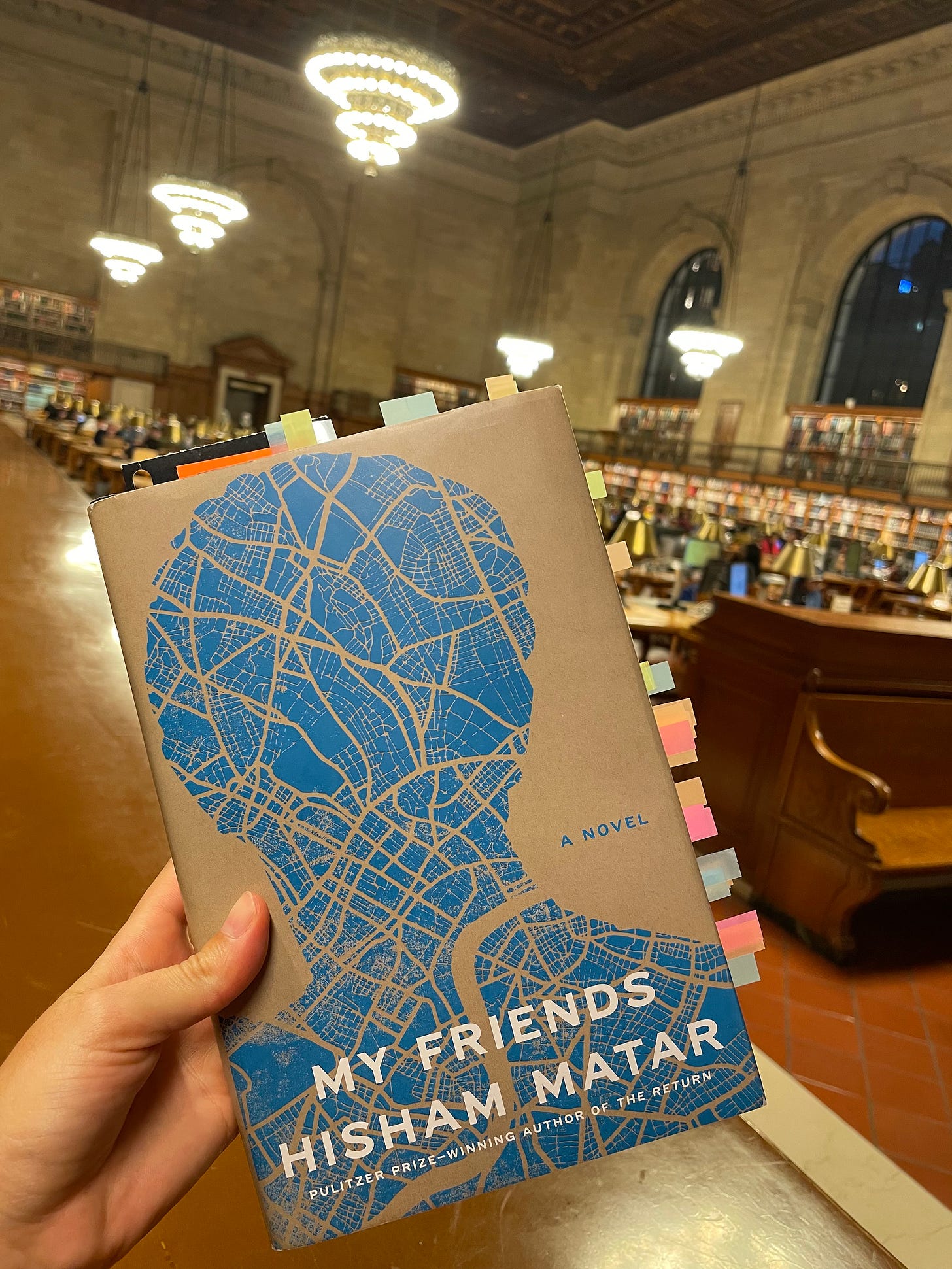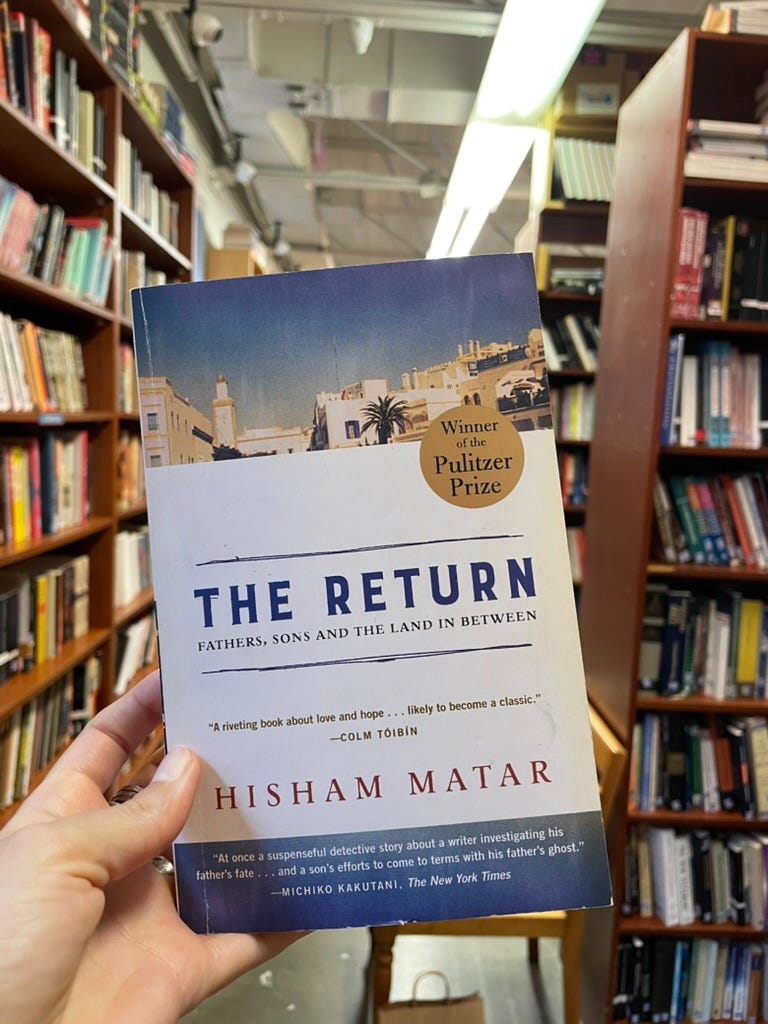Yearning for the Unreachable: Hisham Matar’s My Friends and the Literature of Exile
How does one cure oneself of their country? Of their region?
“To be from countries such as ours... is to continually feel obliged to explain them.”
― Hisham Matar.
Far from home(land),
Unable to return,
No land to claim as yours,
Only yearning lingers—
A longing for the faraway,
For the unreachable home.
*
Yes, this novel has the rare power to transform anyone into a poet—just as it did for me.
There are books, and then there are books. Insert: Hisham Matar’s My Friends. When people ask why I’m so picky about what I read, I want to say I’m not—not really. But when you encounter works like Matar’s My Friends or Hala Alyan’s Salt Houses, something shifts. Your lens changes. Your reflections deepen. And suddenly, popular bestsellers feel irrelevant. Your “mainstream” becomes something entirely different. But hey, that’s just my two cents. Read what brings you joy, but tread carefully—books like Matar’s will change you.
And yes, this novel is a big deal—a very big deal. It is a literary and intellectual masterpiece.
For anyone who is landless, an immigrant, an asylum seeker, or living in exile in the West—displaced from their homeland by war, conflict, or governmental deceit, and watching their homeland from afar in pure, maddening anxiety—this novel will strike a powerful chord.
It is an extraordinary achievement: a profound and deeply moving work that deserves far more recognition. It’s disheartening not to see this book prominently featured on bestseller lists or celebrated in “best of the best” collections. This must change. This book belongs alongside the greats, celebrated and revered.
It’s encouraging to see works like Kaveh Akbar’s Martyr! gaining attention, signaling a growing appreciation for vital literary voices. But Hisham Matar’s My Friends deserves just as much recognition, if not more—it’s a book we cannot afford to overlook.
Matar’s work is as delicate as it is bold—intellectually, emotionally, and formally. It tells the story of three young Libyan men living in exile in London: Khaled, Mustafa, and Hosam. Their lives intertwine, unravel, and ultimately diverge, with moments of friendship, estrangement, and irreversible partings. Two of them—Khaled and Mustafa—meet tragic ends, while Hosam, the writer of the group, carries their stories forward.
The narrative reaches back into their childhoods but begins in earnest in 1984, the year Libyan officials fired a machine gun into a crowd of unarmed protesters outside the Libyan embassy in London’s St. James’s Square. Against this backdrop, My Friends intricately weaves the lives of immigrants, asylum seekers, and exiles, portraying their struggles and resilience with unflinching honesty.
The details are exquisite, capturing the nuances of exile with such precision and empathy that anyone who has experienced displacement will find it profoundly resonant. From shared hardships to deeply personal reflections, every moment feels authentic.
What stands out most is the depiction of the provisional nature of life in exile. For these three men, the inability to fully embrace love or family becomes a defining characteristic of their existence. To commit to love would mean fully committing to exile—a sacrifice too overwhelming to bear.
At its core, the novel is a profound exploration of friendship and human connection, both romantic and platonic. It delves into the intimacy, closeness, and complexities that define these relationships, set against a backdrop of revolutionary ideals and personal sacrifices. When the moment of revolution arrives, each of the three friends responds in unexpected ways. Mustafa, the suave and sardonic estate agent, transforms into a warrior. Hosam, the cosmopolitan and composed writer, rediscovers his love for home, Arabic poetry, and a distant cousin. Khaled, the self-effacing schoolteacher, takes perhaps the most courageous path: embracing the modest, purposeful life he has built for himself in London and resolving to remain true to it.
In a gently ironic nod to his own most famous book, Matar observes that while Khaled may one day visit his parents in Tripoli, his true "return" will not be to an idealized or traumatized birthplace but to the place where he has forged his adulthood.
At its heart, My Friends is also a love letter to literature, celebrating its enduring power to connect, console, and sustain us—even through the most trying of times.
“She was older and all the more beautiful, had the weary tiredness of one who, in surrendering to her life, was ennobled by it.” — From the enchanting prose of Hisham Matar.








